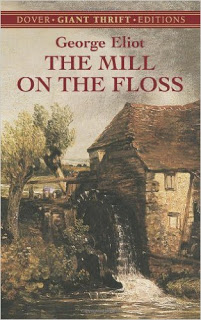

| Online: | |
| Visits: | |
| Stories: |

| Story Views | |
| Now: | |
| Last Hour: | |
| Last 24 Hours: | |
| Total: | |
The Mill on the Floss by George Eliot
Wednesday, February 15, 2017 18:25
% of readers think this story is Fact. Add your two cents.
This post contains spoilers.
The Mill on the Floss by George Eliot is the story of Maggie Tulliver. It is a brilliant character study. The tale starts during Maggie’s childhood. She is very close to her brother, Tom. The relationship between the two siblings plays a key role in this story. At the book’s beginning, Maggie’s father, a fairly prosperous mill owner, is embroiled in a legal battle with a neighbor, Mr. Wakem, the result of which leaves him ruined. The balance of Tom and Maggie’s adolescence is spent in financial straits.
Maggie is sensitive. She is a free thinker who appreciates art and culture. She is different from those around her. Much of the tale illustrates how her gifts and virtues are underappreciated. This lack of appreciation stems from the unfair way that women and girls are viewed, as well as the fact that the people around her are unimaginative and lack understanding.
Tom grows up to be dull, cold and unappreciative of culture. At times, his behavior is terrible. He takes advantage of Maggie’s great affection for him and uses these feelings to control her. For her part, Maggie has an almost unnatural connection and love for Tom.
Philip Wakem, a character who suffers from physical deformities, is a member of the rival Wakem clan. He is extremely intelligent and sensitive. He and Maggie develop a great affection for one another. Their relationship falls short of romantic love and can best be characterized as spiritual love. Their potential marriage is opposed by Tom, who forces them to separate.
Later in the story, Maggie and Phillip reestablish contact. But they continue their relationship in an unrequited manner. When wealthy Stephen Guest appears on the scene and establishes a romantic connection with Maggie, the situation becomes very complicated. Much of the balance of the book is devoted to the conflict between Maggie’s spiritual feelings for Philip and her romantic feelings for Steven.
This novel is a great character study. Maggie is a wonderful literary creation. The book is also filled with wisdom that comes served on platter of delectable writing. In the below passage, the mundane character of everyday life is compared to the old days when things were supposedly grandeur,
“Journeying down the Rhone on a summer's day, you have perhaps felt the sunshine made dreary by those ruined villages which stud the banks in certain parts of its course, telling how the swift river once rose, like an angry, destroying god, sweeping down the feeble generations whose breath is in their nostrils, and making their dwellings a desolation. Strange contrast, you may have thought, between the effect produced on us by these dismal remnants of commonplace houses, which in their best days were but the sign of a sordid life, belonging in all its details to our own vulgar era, and the effect produced by those ruins on the castled Rhine, which have crumbled and mellowed into such harmony with the green and rocky steeps that they seem to have a natural fitness, like the mountain-pine; nay, even in the day when they were built they earth-born race, who had inherited from their mighty parent a sublime instinct of form. And that was a day of romance; If those robber-barons were somewhat grim and drunken ogres, they had a certain grandeur of the wild beast in them,– they were forest boars with tusks, tearing and rending, not the ordinary domestic grunter; they represented the demon forces forever in collision with beauty, virtue, and the gentle uses of life; they made a fine contrast in the picture with the wandering minstrel, the soft-lipped princess, the pious recluse, and the timid Israelite. That was a time of color, when the sunlight fell on glancing steel and floating banners; a time of adventure and fierce struggle,– nay, of living, religious art and religious enthusiasm; for were not cathedrals built in those days, and did not great emperors leave their Western palaces to die before the infidel strongholds in the sacred East? Therefore it is that these Rhine castles thrill me with a sense of poetry; they belong to the grand historic life of humanity, and raise up for me the vision of an echo. But these dead-tinted, hollow-eyed, angular skeletons of villages on the Rhone oppress me with the feeling that human life– very much of it– is a narrow, ugly, grovelling existence, which even calamity does not elevate, but rather tends to exhibit in all its bare vulgarity of conception; and I have a cruel conviction that the lives these ruins are the traces of were part of a gross sum of obscure vitality, that will be swept into the same oblivion with the generations of ants and beavers.”
The writing is so good in the above passages. The imagery of the monumental things and people of the past is very impressive. It makes such an effective contrast with the more modern “dreary” and “ruined” villages. In the above quote, even the villains were magnificent, they were “demon forces forever in collision with beauty” and “they were forest boars with tusks, tearing and rending.” The prose also creates such an effective contrast between the mundane aspects of life and the awe-inspiring parts of human existence.
Eliot goes on to observe that the giants of the past also overshadow the story’s current characters.
“Perhaps something akin to this oppressive feeling may have weighed upon you in watching this old-fashioned family life on the banks of the Floss, which even sorrow hardly suffices to lift above the level of the tragi-comic. It is a sordid life, you say, this of the Tullivers and Dodsons, irradiated by no sublime principles, no romantic visions, no active, self-renouncing faith; moved by none of those wild, uncontrollable passions which create the dark shadows of misery and crime; without that primitive, rough simplicity of wants, that hard, submissive, ill-paid toil, that childlike spelling-out of what nature has written, which gives its poetry to peasant life. Here one has conventional worldly notions and habits without instruction and without polish, surely the most prosaic form of human life; proud respectability in a gig of unfashionable build; worldliness without side-dishes.”
The Tullivers and Dodsons mentioned above are Maggie’s maternal and paternal families. Her aunts and uncles are often jealous, vindictive, braggadocios and constantly bickering. While her father is not without his virtues, he becomes obsessed with vengeance upon the Wakems. Tom can be cold and controlling. He becomes work obsessed. He holds no romantic thoughts at all.
I think that the above quotes are a key to this novel. Maggie’s life can be viewed as the exact opposite of the “sordid life” lived by her relatives. Her relations often live a “a “narrow, ugly, groveling existence.” These passaes come early in the book. In retrospect, Maggie’s story seems to reach the level of magnificence embodied in the past as described here. Her relatives are often vulgar, but she is not. She strives for sublime principles and experiences romantic visions. She has a strong faith and tries to do what is right. Almost everything mentioned in the above paragraph characterizes positive things about Maggie and negative things about her relatives. One cannot help but to think that Maggie would be better suited had she lived in the times of romance, robber barons and drunken ogres. It is a testament to just how much her character shines and that one could picture her among such heroes and villains.
“The angry, destroying god” that made “their dwellings a desolation” also foreshadows a terrible flood that eventually sweeps away much of the world depicted in this story.
This book is also filled with ideas, philosophy and observations on human nature. These ruminations are often tied to the story’s themes. Like Eliot’s “Middlemarch,” this work brims full of references to various art forms.
The plot develops very slowly. Eliot is more interested in developing characters and ideas than in moving things along. Those looking for a plot driven narrative might be bored with sections of this novel. However, the thoughtful and patient reader will be rewarded.
There is so much to this book. At its heart, it is a great character study told in magnificent prose. In addition to Maggie, it is also filled with complex and well wrought out characters. It is full of philosophy, wisdom and culture. It is an interesting story. Ultimately it is a brilliantly written exploration of characters and ideas.
This is a blog about good books. It is a place for me to share my musings about literature, history, culture and science. Most of what one will find here are not plain reviews. Instead, when I discuss a book I tend to explore a thought or two that I have about the work. This is a place for the enthusiastic reader who is curious about the world!
Source: http://briansbabblingbooks.blogspot.com/2017/02/the-mill-on-floss-by-george-eliot.html



